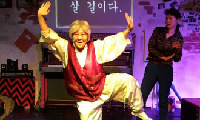|
News Among the 50,000 volunteers taking part in the Rio 2016 Olympic and Paralympic Games will be a small group of people for whom the Olympic values of friendship and respect for others have a very special meaning: 38 refugees and asylum seekers from areas of unrest and conflict who have chosen Brazil as their new home For the refugees, providing valued services at the Games will help them reconnect with the outside world and build their self-esteem, after experiencing the anguish of losing their homes and leaving their friends and families behind "The Games are an opportunity to interact with other foreigners," taxi driver Sekou Dabo from Guinea says Dabo fled to Brazil after his mother was killed in religious violence in the African country "They will gave us the benefit of being connected to other people " Sekou Dabou from Guinea poses proudly in front of the world's most famous football stadium (Photo: Rio 2016/Gabriel Nascimento) "My father always told me that while we may need money, we also have to take advantage of any opportunity there is to grow," says Prisca Mbamu, a journalist who fled war-torn Democratic Republic of the Congo when she fell foul of local authorities Prisca came to Brazil in 2013, currently works as a hairdresser in the Madureira district of Rio and has signed up to serve as a volunteer in the Games Rio 2016 is working with the United Nations High Commissioner for Refugees (UNHCR) and local Catholic organisation Cáritas to select refugees and asylum seekers to work in the Olympic and Paralympic Games either as employees or as volunteers In their new positions, the refugees will help the organising committee in a wide range of key areas, including transport, interpreting and customer service Prisca Mbamu came to Rio from Democratic Republic of Congo and is looking forward to taking part in the Games (Photo: Rio2016/Gabriel Nascimento) From Syria to Brazil One of the volunteer refugees in Rio is Mohammad Ghannam, a 30-year old Syrian who left his devastated home country two years ago to build a new life in Brazil "During the Games I want to introduce foreign visitors to the Brazilian culture that I am learning," he says "I want to show off Brazil's heart " Brazil has given thousands of Syrians the chance of a new start At the beginning of May, a 12-year-old Syrian refugee was chosen to be one of the first 10 bearers of the Olympic Torch on the day it arrived in Brazil Hanan Khaled Daqqah and her family arrived in São Paulo in 2015, under a humanitarian programme run by the Brazilian government Some 8,000 special visas have been issued to Syrians under the initiative Hanan now studies at a public school near her home, speaks Portuguese fluently and has many Brazilian friends Hanan (centre) studies alongside new Brazilian friends at school in São Paulo (Photo: UNHCR/Gabo Morales) In April, another Syrian refugee – swimmer Ibrahim Al-Hussein, who lost part of his leg in a bombing – carried the Rio 2016 torch through a refugee camp in Athens Meanwhile, the International Olympic Committee is mounting a team of refugees who will compete under the Olympic flag at the Rio 2016 Games For some Syrians, adaptation to life in Brazil has been relatively straightforward even though they are far from their homeland Refugees say that Brazil's multi-ethnic culture has helped the integration process The country has a long history of Arab immigration; Mohammad Ghannam points to the abundance of Arab restaurants in Rio and to the decoration of Catete Palace, partly inspired by the Moorish culture of medieval Portugal Refugee judokas searching for peace while fighting for their Olympic dream in Rio Inspired by sports The volunteers say they are excited to be participating in the world's greatest festival of sport "My father used to say that with sport another person's achievements can make you happy," biomedical scientist Keila Castillo from Venezuela says Keila arrived in Rio less than a year ago and is herself an active sportswoman, playing football and running marathons Filmmaker Aklah Fiasese is looking forward to the stories that will come out of the Games (Photo: RIo 2016/Gabriel Nascimento) Another sports fan who will be contributing to the Games as a volunteer is Aklah Fiasese, a 58-year-old film maker from Togo who fled the country after his television programmes upset the authorities As well as working as a volunteer, Fiasese is confident that the very first Olympic Games in South America will provide plenty of material for a new production One thing is for sure – there will be no shortage of stories to tell when the whole world comes to Rio in less than three months' time |
The volunteer spirit: refugees seize the Rio 2016 opportunity
September 18, 2016
VIEWED: 0






